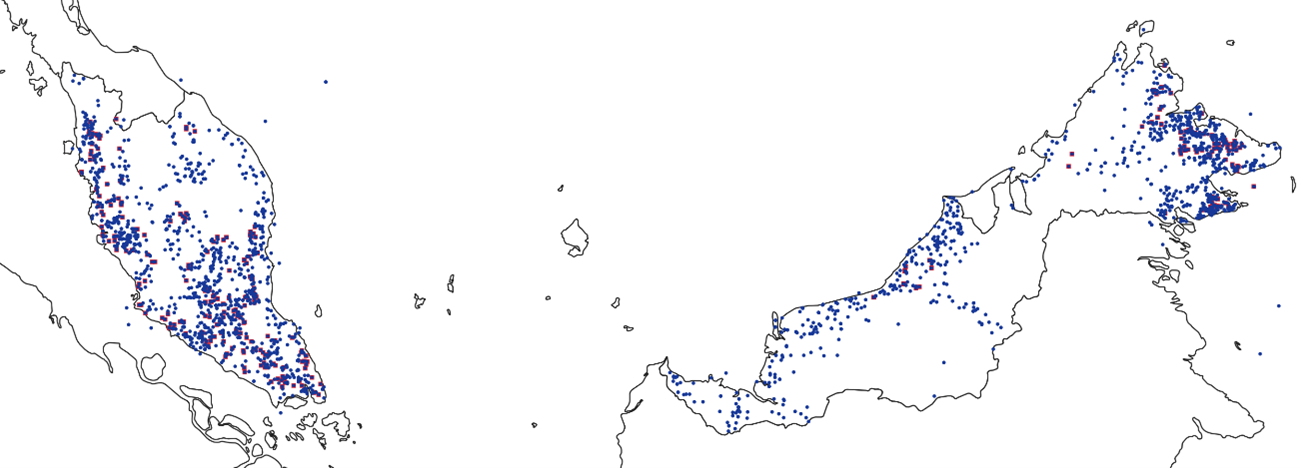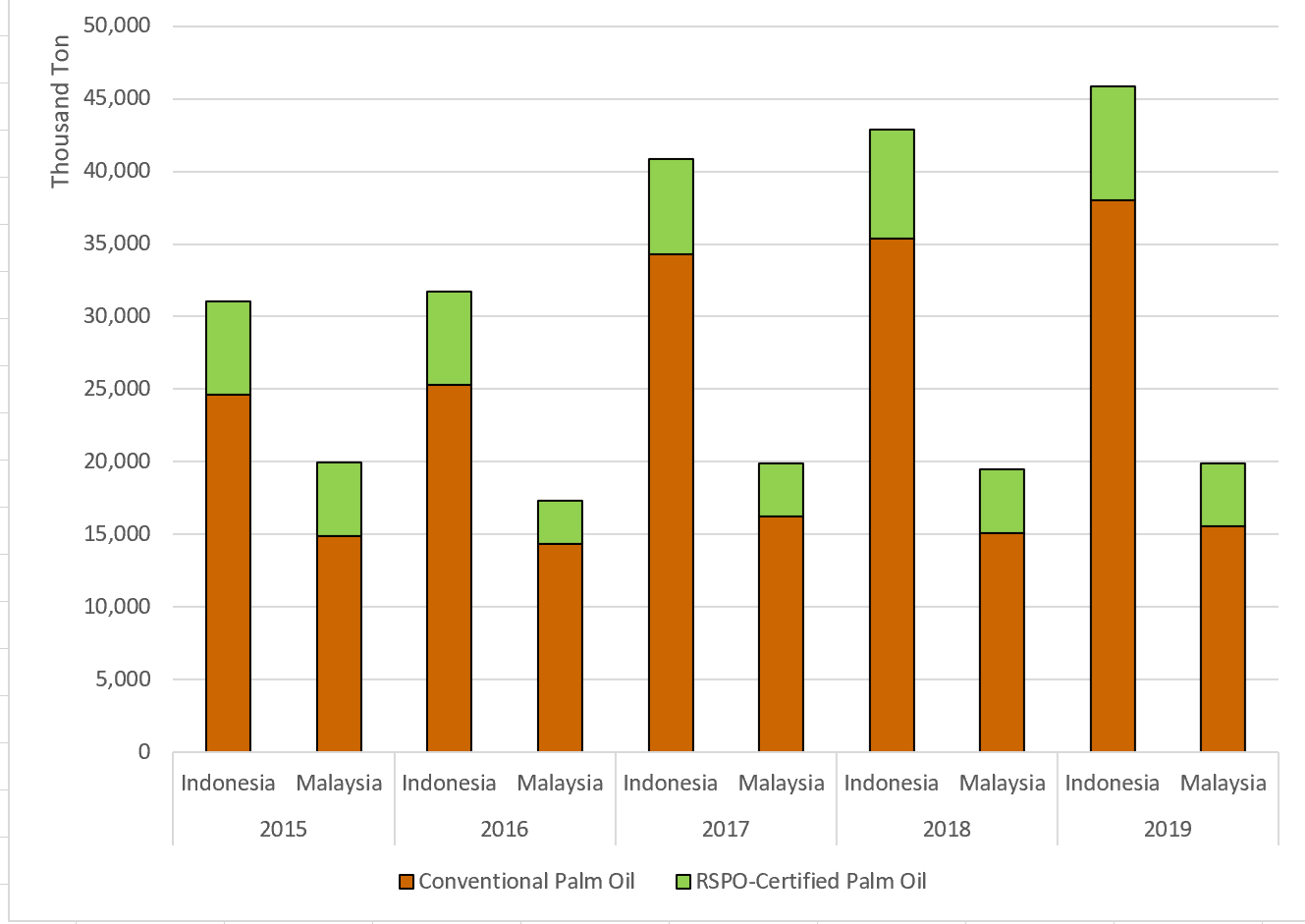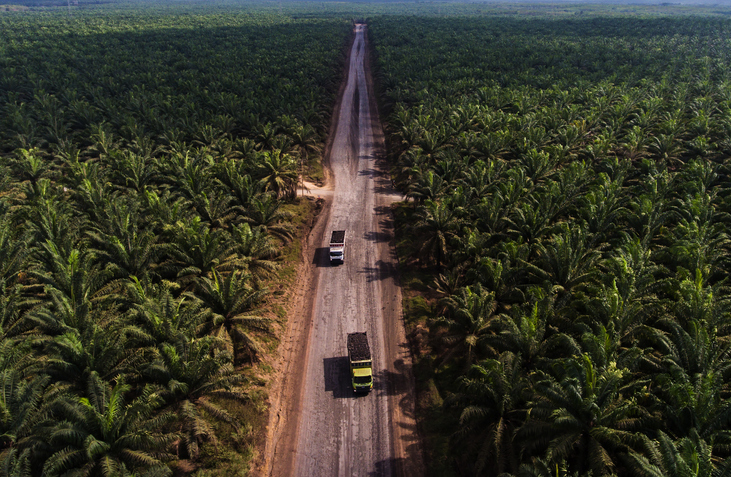IDE Research Columns
Column
Friend or Foe? Global and Local Sustainability Standards in the Palm Oil Sector
Etsuyo MICHIDA
Institute of Developing Economies, JETRO
July 2022
Sustainability standard schemes have been used globally to promote sustainable agricultural consumption and production for more than decades. Nongovernment organizations in Europe and the United States have created these globally recognized standards driven by the need for sustainable consumption. Furthermore, both public and private sectors in various countries have subsequently introduced local standards enhancing sustainable production. Consequently, growers, firms, and consumers have choices among multiple standards with different characteristics. Is the proliferation of standards beneficial or harmful to enhance sustainability? Previous studies do not fully address the roles of local standards. This study investigated the case of palm oil sustainability standards through a focus on a global standard and the counterpart local standards. Complementary roles of global and local standards depending on the market and producers are shown.
Mechanism of Global Sustainability Standards
In this era of globalization, developed countries consume agricultural commodities produced in developing countries, including coffee, palm oil, soy, beef, and timber products. It is increasingly evident that goods produced through global value chains impact social and environmental conditions in the producer countries. Specifically, lower-income countries are severely affected due to the weak implementation of the regulation. Therefore, the private sector in developed countries created voluntary sustainability standards to mitigate the negative impact and promote sustainable production. Sustainable production refers to protecting natural forests with biodiversity, improving labor conditions, and respecting human rights. These sustainability standards are adopted transnationally by growers, firms, retailers, and banks and are accepted as global standards.
The global standard relies on three mechanisms. The first mechanism is creating a market for sustainable products. The second is using the purchasing power of consumers who are willing to pay markup prices for certified products. The third is transferring the markup prices to producers who adopt sustainable production methods. Therefore, a private standard attempts to transfer payments to prevent negative externalities from consumers in developed countries to producers in developing countries. A rich body of literature contributes to the understanding of global sustainability standards in terms of impacts on local producers (Dragusanu, Giovannucci and Nunn 2014), small-scale producers (Handschuch, Wollni and Villalobos 2013), the environment (Gatti, Liang, Velichevskaya and Zhou 2019), and trade (Ehrich and Mangelsdorf 2018).
Local and Public Standards for the Palm Oil Sector
Compared with global standards, limited research focuses on local sustainability standards. This study attempts to fill the gap by examining local standards developed by producer countries. The development of local standards has been motivated by the success of global standards. For example, local good agricultural practices (GAPs) follow Global G.A.P. (Michida and Nabeshima 2017; My et al. 2018), and the transnational Forest Stewardship Council precedes local timber sustainability standards (Pattberg 2005). Furthermore, national palm oil standards are derived from the global Roundtable for Sustainable Palm Oil (RSPO) standard (Humphrey and Michida 2021).
The palm oil sector in Indonesia and Malaysia is an insightful case for investigating both global and local standards. In 2007, the RSPO developed sustainability criteria. In 2011 and 2013, the Indonesian Sustainable Palm Oil (ISPO) and Malaysian Sustainable Palm Oil (MSPO) standards followed these standards, respectively. Figure 1 illustrates, as of 2021, the geographical distribution of MSPO-certified growers, which are represented by blue dots, and RSPO-certified growers, which are represented by red dots. MSPO-certified producers are more widespread than RSPO-certified. In the next section, our discussion focuses on the RSPO and MSPO standards.

Figure 1. Geographical Distribution of Malaysian Sustainable Palm Oil (Blue) and Roundtable for
Sustainable Palm Oil (Red) Standards in Malaysia in 2021
Source: Author created from Malaysian Palm Oil Certification Council and RSPO data
Are Characteristics Different Between RSPO and MSPO Standards?
The RSPO standard triggered the Malaysian government’s development of the MSPO standard, and MSPO learned both best practices and challenges from the RSPO experience. MSPO standard criteria have environmental, social, and governance requirements, which is similar to the RSPO standard criteria. Additionally, both standards require third-party certification and enable supply chain traceability.
However, the focus of the RSPO and MSPO standards on sustainability differs. The RSPO standard targets consumers in developed countries who are often concerned about issues related to the goods they purchase and global public goods, such as global warming and biodiversity. Consequently, the RSPO standard places stricter requirements on deforestation and peatland use, which causes global warming gas emissions to increase.
On the other hand, the MSPO standard refers to national or regional legislation, local production practices, and local geographical characteristics. Some MSPO standard environmental criteria differ from that of the RSPO standard. Localization of the MSPO standard is crucial to its diffusion, notably among small-scale producers. For the government of a producing country, helping small-scale producers is inevitable to plug them into global value chains, reduce poverty, and stimulate economic development, especially in areas in which agriculture is the primary source of income.
The primary difference in the characteristics lies in the target group of the two standards. Although the RSPO standard is private and voluntary, the MSPO standard is public and makes certification mandatory for all growers. The MSPO standard has learned that the RSPO standard has limited uptake among growers because of the criteria that depart from local practices and its voluntary nature. Therefore, the MSPO standard has modified its criteria and target group to fit the national priority.
Market Segmentation
The MSPO standard’s modifications have caused its criteria to diverge from those of the RSPO. Some palm oil users consider the MSPO standard criteria less stringent and not sustainable from their perspective. Consequently, local standard certificates do not provide access to a specific market. Cases exist in which sustainability policy only recognizes global standards. For example, the European Union did not list ISPO and MSPO as sustainability standards for Renewable Energy Directive I. To date, Japan recognizes the RSPO standard for their Feed-in-Tariff policy for electricity generation from palm oil but not the MSPO or ISPO standard. For the comprehensive economic partnership agreement between Indonesia and European Free Trade Association, Switzerland recognizes only the RSPO standard for preferential tariffs. In contrast, China recognizes the MSPO standard for its Green Food label. The 2020 Tokyo Olympic and Paralympic Committee in Japan recognized the RSPO, ISPO, and MSPO standards.
Over the past several years, the share of RSPO-certified palm oil floats approximately 20% of its production in Indonesia and Malaysia. The RSPO standard’s share has not expanded because of a lack of demand for sustainable palm oil. Developed countries demand RSPO-certified palm oil because of policy, consumer preference, and ability to pay the premium. Primary palm oil markets, such as China, India, and other emerging economies, demand affordably priced palm oil for food and care less about sustainable palm oil (Humphrey and Michida 2021; Schleifer and Sun 2018). Once the local standards are implemented, non-RSPO palm oil becomes certified by ISPO or MSPO standards. The MSPO standard has steadily approached full implementation, and the ISPO standard is in its process. Once implementation progresses, local standards transform non-RSPO palm oil into a certified product. Consequently, as RSPO-certified oil flows to some developed countries, palm oil certified by local standards flows to other markets, especially emerging economies. Therefore, market segmentation occurs for RSPO and the two local standards.

Figure 2. Production of Conventional and Roundtable on Sustainable Palm Oil Certified Palm Oil between
2015 and 2019
Source: Author created from Roundtable on Sustainable Palm Oil Impact Report 2015–2019, Malaysian Oil
Palm Statistics (2019), Directorate General of Estate Crops, Indonesia homepage
Producer Segmentation
We analyzed the characteristics of growers that adopted the RSPO standard in Malaysia to determine whether producer segmentation would occur (Michida 2022). Specifically, we investigated the factors that impacted growers’ decisions to adopt the RSPO standard’s certification. The result indicated that a larger plantation area increases the probability of adopting RSPO standard certifications.
Moreover, the easiness of exportation to the primary market positively affects growers’ decisions to obtain RSPO standard certificates. The export market effect is measured by the share of palm oil exported to the EU from the nearest seaport. Moreover, listed companies are significantly more likely to obtain RSPO standard certificates. The result implies that environment, social, and governance investments incentivize growers of listed holding companies to adopt RSPO standard certifications. RSPO standard certificates help growers attract international investors and develop a sustainable brand image.
Does Standards Proliferation Harm Global Sustainability?
Our palm oil case study suggests that global and local standards create market and producer segmentation. The result hints that both global and local standards play diverse roles. Multinational companies adopt consumer-driven global standards to contribute to sustainability and differentiate themselves from less sustainable companies. Although consumers in emerging economies demand more sustainable products as their incomes increase, seeing a noticeable change takes time. However, if producer governments make it mandatory to adopt sustainable standards for producers, non-sustainable oil will be eliminated from the market, leaving only the choice of sustainable consumption in emerging countries.
Given that palm oil production in Indonesia and Malaysia accounts for a substantial portion of global production, producer mandatory sustainability standards play a prominent role in reducing non-sustainable choices from the global market. Sustainable production and consumption need multiple options of suitable standards to enhance environmental, labor, and human rights protection depending on markets and producers. Global and local standards would be complimentary for the palm oil sector in the north and south. Finally, proper implementation of all standards is the key to enhancing sustainability through standards (Humphrey and Michida 2021).
Author’s Note:
This column is based on the following research conducted on sustainability standards in the Institute of Developing Economies, JETRO.
Michida, E., J. Humphrey, and K. Nabeshima. 2017. Regulations and International Trade: New Sustainability Challenges for East Asia. Cham: Palgrave Macmillan.
Michida, E., J. Humphrey, and D. Vogel. 2021. Diffusion of Public and Private Sustainability Regulations: The Responses of Follower Countries. Cheltenham: Edward Elgar.
References
Dragusanu, R., Giovannucci, D., and N. Nunn. 2014. "The Economics of Fair Trade." Journal of Economic Perspectives 28(3): 217-236.
Ehrich, M., and A. Mangelsdorf. 2018. "The Role of Private Standards for Manufactured Food Exports from Developing Countries." World Development 101: 16-27.
Gatti, R. C., J. Liang, A. Velichevskaya, and M. Zhou. 2019. "Sustainable Palm Oil May Not Be So Sustainable." Science of the Total Environment 652: 48-51.
Handschuch, C., M. Wollni, and P. Villalobos. 2013. "Adoption of Food Safety and Quality Standards among Chilean Raspberry Producers–Do Smallholders Benefit?" Food Policy 40: 64-73.
Humphrey, J., and E. Michida. 2021. "National Palm Oil Standards in Asia: Motivations and Impacts on Trade and Rural Development." In Diffusion of Public and Private Sustainability Regulations: The Responses of Follower Countries, edited by E. Michida, J. Humphrey, and D. Vogel, 17-46. Chaltenham: Edward Elgar.
Michida, E. 2022. "Public Acceptance and Effectiveness of Self-regulating Sustainability Standards of Palm Oil Industry." In Sustainable Oil Palm Development and Trade: Redefining Risks and Opportunities, edited by V. Anbumozhi and H. Nishimura. Los Angeles: Sage, forthcoming.
Michida, E., and K. Nabeshima. 2017. "Diffusion of Private Food Standards from the European Union to Asia." In Regulations and International Trade: New Sustainability Challenges for East Asia, edited by E. Michida, J. Humphrey, and K. Nabeshima, 107-129. Cham: Palgrave Macmillan.
My, N. H. D., M. Demont, E. J. Van Loo, A. De Guia, P. Rutsaert, T. H. Tuan, and W. Verbeke. 2018. "What Is the Value of Sustainably-produced Rice? Consumer Evidence from Experimental Auctions in Vietnam." Food Policy 79: 283-296.
Pattberg, P. H. 2005. "The Forest Stewardship Council: Risk and Potential of Private Forest Governance." The Journal of Environment & Development 14(3): 356-374.
Schleifer, P., and Y. Sun. 2018. "Emerging Markets and Private Governance: The Political Economy of Sustainable Palm Oil in China and India." Review of International Political Economy 25(2): 190-214.
* Thumbnail image: Afriadi Hikmal/ Moment/ Palm Oil Plantation- stock photo (GettyImages)
** The views expressed in the columns are those of the author(s) and do not represent the views of IDE or the institutions to which the authors are attached.


